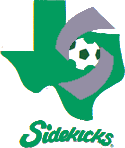
Newspaper Story

|
|
Newspaper Story |
|
REPRINTED WITH THE PERMISSION OF THE AUTHOR
The good news that came out of the Dallas Sidekicks' office on Friday suddenly
turned sour Monday when general manager Ron Adkins announced negotiations to
purchase the team had ended.
The proposed buyers, a group of nine investors headed by oilman Jim Graham,
had reached an agreement in principle with the club on Friday. Monday, however,
the deal fell through, leaving the Sidekicks, for all intents and purposes,
as another failed Major Indoor Soccer League franchise.
Neither side would specify the reasons the deal was halted.
"I'm really can't talk about it,' said Dewey Dalton, an attorney and potential
investor with Graham's group. "I'm not at liberty to say. We (him and Graham)
decided to leave it general.'
Adkins said the group's final proposal did not satisfy the conditions outlined to meet the terms of the sale.
"I felt our group had crossed all the hurdles,' Graham said. "I talked to my group Sunday and we felt that our conditions were agreeable. Everybody worked hard and tried to come to a conclusion. I thought at 11 o'clock (Monday morning) we were very close, but both sides had set noon as the deadline, and it just didn't work.'
Adkins will now inform owner Donald Carter "about the situation and will carry out his instructions regarding the sale of the assets.'
Graham would not specify the reasons the deal fell through, but said that if he had dealt face-to-face with Carter, a deal could have been negotiated. Carter has been with his mother, who is currently hospitalized. Graham had been dealing with Carter's attorneys and Adkins.
"We sent Don Carter a letter telling him our proposal, but we don't have any way of knowing if he received it. We're hoping he will call,' Graham said. "We came as close as we could, we fought a good fight. The goal was a good goal.'
"I honestly believed we would make it work,' Sidekicks coach Gordon Jago said. "I'm eternally optimistic that a phone call will come (to buy the club). Until the players start going out of here, I've got hope.'
Jan Rogers, wife of Mary Kay Cosmetics chief executive officer Richard Rogers and a member of the Graham group, said: "We tried. I felt we gave it our best effort.'
The Sidekicks became the 25th MISL franchise on June 29, 1983, when Carter purchased the defunct New Jersey Rockets franchise for $500,000. With Monday's announcement, they become the 18th MISL team to fold or change cities in the league's 8-year history, and the second team to fold this season. Pittsburgh owner Edward J. DeBartolo folded that franchise at the end of the season. The MISL did add a New York franchise for the 1986-87 season.
"It will take a year to assess if it hurts the league,' MISL commissioner Bill Kentling said of the Sidekicks' folding. "The league was up and moving before Dallas came in. I feel worse for the fans than the league. In the league, you lose a Dallas, you get a New York. It goes on. I would not be surprised if Dallas has another MISL team in a couple of years.'
After finishing 12-36 in their first season, the Sidekicks rebounded this past season with a 25-23 record and an average attendance of a little more than 7,000 at Reunion Arena, an increase of 2,500 from 1984-85.
Kentling said Carter still holds the rights to all the players. Carter has paid his league dues through July 1, but Kentling expects players to be sold quickly as the team's payday is June 15.
The Sidekicks lost $5 million in two MISL seasons and Carter put the team up for sale April 23, four days after it was eliminated from the playoffs. Carter, who expected to lose $1 million in each of the first two seasons, cited double projected losses over the first two years. He made three stipulations for the sale:
* The team must stay in the Dallas-Fort Worth area;
* The buyer must post a $2.5 million letter of credit to ensure the team's operation through the playoffs of the 1986-87 season;
* And Adkins and Jago would each receive 10 percent of the club.
"The only area we did not have problems was in the location of the team,' Adkins said. "It was the only area we agreed upon 100 percent.'
Concerning the $2.5 million letter of credit, Adkins said if he and Carter's attorneys felt they had the right buyer, then Carter was willing to move the letter of credit down to "half that amount.' Adkins said that was done.
As for the third stipulation, Rogers said "that wasn't a problem. Basically, that's severance pay. Really, this wasn't a money-making deal and Mr. Carter realized that there were changes to be made, so he wrote that in as kind of severance pay. I immediately interpreted that as a gold watch. I think everyone knew that there would be changes, but I don't think there were any hard feelings over that.'
"I'm really disappointed,' said forward Tatu, the Sidekicks' leading scorer both seasons and their most popular player. "Unfortunately, it looks bad for the city. I don't think money was the problem. Everybody asked what the problem was but the answer was the sale did not go through. They did not give us the reason.
"I will go through the rest of my life wondering,' Jago said. "There's a little bit of anger on the staff because they've seen the signs in camp sign-ups, season tickets sales and they're angry it won't go on.'